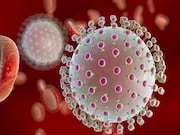Universal mini-pool nucleic acid testing only during high mosquito activity cost-effective in Puerto Rico
MONDAY, Jan. 7, 2019 (HealthDay News) — Screening donated blood for Zika virus is cost-effective only in the high mosquito season in Puerto Rico, according to a study published online Jan. 8 in the Annals of Internal Medicine.
W. Alton Russell, from Stanford University in California, and colleagues examined the cost-effectiveness of universal individual donation nucleic acid testing (ID-NAT) of donated blood for Zika virus in the first year of screening versus alternatives in a microsimulation that captured Zika-related harms to transfusion recipients, sexual partners, and their infants.
The researchers found that universal mini-pool NAT (MP-NAT) exclusively used during high mosquito season was cost-effective in Puerto Rico at $81,123 per quality-adjusted life-year (QALY). In the 50 states, no screening policy was cost-effective. Compared with no screening, universal ID-NAT cost $341 million per QALY. In the sensitivity analysis, in 64 percent of probabilistic sensitivity analysis iterations, MP-NAT only during the season of high mosquito activity was most cost-effective in Puerto Rico only. No intervention was cost-effective in 99.99 percent of iterations in the 50 states. Cost-effectiveness was highly dependent on the assumed infectious donations rate.
“Current screening policies are extraordinarily costly per QALY saved, which suggests the need for a new paradigm in preventing transfusion-transmitted infections,” write the authors of an accompanying editorial.
Several authors disclosed financial ties to the biopharmaceutical industry.
Abstract/Full Text (subscription or payment may be required)
Editorial (subscription or payment may be required)
Copyright © 2019 HealthDay. All rights reserved.








